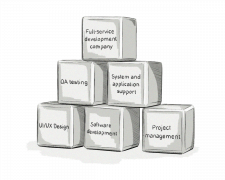Startups are faced with many early challenges and obstacles. Some can be conquered quickly without having any real long-term effects, while others need to be thoroughly considered, as their outcomes can have lasting consequences.
A major challenge startups face in the beginning is deciding who is going to handle the development of their application. This decision not only relates to non-technical founders, but to those who have advanced technical skills as well, as they quite often require more manpower or a different set of skills than they currently have.
Finding the right development team is one challenge that will have a lasting effect on the future of the application and startup, and can also have a direct impact on its success or failure. It can massively influence your chances of acquiring seed funding and future investors as well, because investors usually want to see clear evidence of a solid technical role within the startup.
For many looking for a development partner, the decision comes down to this:
Should we hire an established full-service software-development team to take on the role of Technology Partner,or team up with a technical co-founder (or CTO) and then build an in-house development team from the ground up?
While finding a qualified technical co-founder and building an in-house team may appear to be the better choice, as in most cases you will have the whole team under one roof, it can often bring a number of problems that can be very difficult to resolve, and thus draw out the development process, leading to a delayed launch date – or worse, completely halting all progress.
Here are a couple of main problems associated with finding a technical co-founder and building your own development team:
- Finding the right person can take many months and delay building the software – unless you’re happy to employ Average Joe and just hire any Tom, Dick, or Harry for the heavy lifting.
- Employing a technical co-founder adds a lot of risk to the business because if the partnership doesn’t work out, firing them and breaking the relationship can get quite messy.
It is situations like this that make choosing a technical co-founder a suboptimal solution for many startups.
Full-service development teams, on the other hand, provide startups and entrepreneurs with a number of benefits. Here are the top six:
1. Specialized services
This is probably one of the most compelling reasons to hire an established software-development company.
Let’s imagine you want to build a specialized piece of software, like an ad-tech platform. The experience, skills, industry insights, and knowledge needed are extremely rare to come by, and finding them in a technical co-founder as well as four to five different developers, and then getting them all together, is extremely time-consuming and difficult.
However, if you are intending on building a specialized application or platform, finding a software-development team that has years of experience and a successful track record is a much easier task. This team will be able to cater to all your needs; provide detailed insights into the market, your opportunities, and challenges; and deliver a product that meets, or exceeds, your initial requirements.
2. Ability to scale (and downsize) the team
Developing software is a team effort, but it often doesn’t require the whole team working together at the same time.
Designers may only be required during the prototyping stage and involved in transitioning to the developers, the developers may not be required for the first month or so, and the sysadmin/devops will probably only need to step in towards the beta release.
If you, or your technical co-founder, have built your own in-house team and included a few individuals from each department, then what will they do when their skills are not required during the development process? Sit around twiddling their thumbs? Go on coffee runs for the team followed by a three-hour foosball tournament? This is simply a waste of funds and talent.
Software-development teams, on the other hand, are well equipped to scale up and down according to the planned work. If the designers need to work on the project for the first few weeks, then the developers will either work on a different or internal project, and sysadmins always have other tasks to do. Also, the responsibility to ensure that each team member has adequate work doesn’t fall on you – so that’s one less thing to worry about.
3. Successful track record as a team
What makes a great team, one that has been working together for an extended period of time, or one that is just getting past the introductions and still trying to remember each other’s name?
One major element that is impossible to replicate with new teams is a successful track record. A large part of software development is teamwork, and getting the right rhythm can take months or years to achieve, as it takes time to learn and understand how each member operates and to build team morale and spirit.
Most established companies have this teamwork structure down pat, whereas new teams have to start from the beginning and spend time building the perfect teamwork environment. Unfortunately, this is time a lot of startups don’t have.
4. Hitting the ground running
Make hay while the sun shines, the early bird catches the worm – you get the point.
Hiring a software-development company will mean that you can seize opportunities and get your project off the ground sooner. Imagine it takes you a month to find a technical co-founder and set up a team. Apart from being a highly ambitious timeframe, it’s time that you are losing on design and development, and more importantly, market opportunities. This is time that could otherwise be spent prototyping your app and gaining early user feedback.
5. The software-development process
Another overriding benefit of a full-service technology partner is their ability to plan and execute the software-development process to a T – this is the backbone of any project.
Just like the example above about teamwork contributing to a successful track record, finding a team that has the workflow established will not only help speed up development, but will also deliver a successful product.
And don’t think for a second that going out and finding a technical co-founder with a Professional Scrum Master II certificate and a few developers and designers with experience in developing software in Agile will create a perfect development process, as agile means different things to everyone, and every company incorporates different agile tools and processes. It takes time for everyone to work in sync, even with this methodology.
Also, there are many parts that make up the development process, e.g. continuous integration, automated testing, code reviews, etc., and finding a team that has all parts of the development process in place will ensure your project runs smoothly.
6. HR-related problems
If you already hold the title of CEO, don’t add “and Human Resources Director” to it.
The biggest part of any software-development project is not the technology, not the process, not the documentation – it’s the people.
If you decide to build a team of, say, four people, and two months into the project, one developer calls in sick with the flu, your only designer breaks his wrists snowboarding, and your front-end developer decides to jump ship and start working for the competition. What would you do then?
These issues and situations are not uncommon, and when 80% of your workforce is absent, that means 95% of the work won’t get done. Opting to work with a development team will eliminate a lot of these issues because if one developer is sick, the team can just rotate a new developer in. It’s all part of being an agile software-development team.
So, now that we’ve covered the benefits of choosing a software-development team over a technical co-founder and in-house team, here’s how to find the right full-service technology partner:
1. Look for similarities.
If you want to build a platform that is based on analytics, then find a software-development team that has experience and success with creating analytics-based software.
You may even be lucky and find a team that has experienced success in creating their own platforms and apps in your area of interest; they’ll be able to share their experiences with you and provide advice they gained first-hand.
2. Check out their level of engagement with your idea.
A great software-development team is one that not only understands what your project is about, but engages with your idea, immerses themselves in your customer’s journey, understands your users’ needs, are proactive in finding solutions, and really puts the client under the spotlight to check their knowledge and see if they’ve done their homework.
3. Previous success and testimonials.
I touched on this above, but it needs to be reiterated. By scanning the company’s website for case studies, testimonials, and other signs of social proof, you can gain a deeper understanding of their quality of work, how well they work with their clients, and their overall ability to take a project from the planning phase to the investment-raising phase.
Look for signs that demonstrate their ability to build software that experiences growth, attracts investment dollars, and undergoes exits – all things you will want your startup to do.
Software-development companies often become long-term business partners, so making sure you choose the right one at the beginning is critical. Above all, find one that matches your goals, possesses industry insights and experience, and whose desire to launch a successful project is just as strong as yours.







